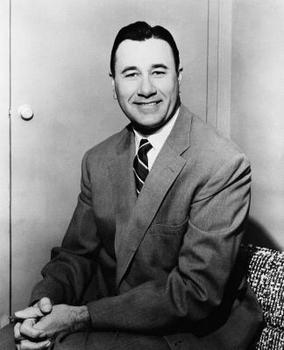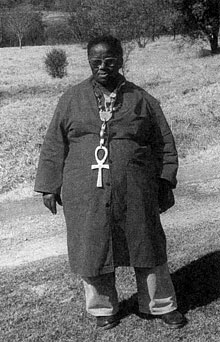
Zulu people are a Nguni ethnic group native to Southern Africa. The Zulu people are the largest ethnic group and nation in South Africa, with an estimated 13.56 million people, living mainly in the province of KwaZulu-Natal.

KwaZulu-Natal is a province of South Africa that was created in 1994 when the Zulu bantustan of KwaZulu and Natal Province were merged. It is located in the southeast of the country, with a long shoreline on the Indian Ocean and sharing borders with three other provinces and the countries of Mozambique, Eswatini and Lesotho. Its capital is Pietermaritzburg, and its largest city is Durban. It is the second-most populous province in South Africa, with slightly fewer residents than Gauteng.

Granville Oral Roberts was an American Charismatic Christian televangelist, who was one of the first to propagate Prosperity Gospel Theology. He was ordained in both the Pentecostal Holiness and United Methodist churches. He is considered one of the forerunners of the charismatic movement, and at the height of his career was one of the most recognized preachers in the US. He founded the Oral Roberts Evangelistic Association and Oral Roberts University.

Prince Mangosuthu Gatsha Buthelezi was a South African politician and Zulu prince who served as the traditional prime minister to the Zulu royal family from 1954 until his death in 2023. He was appointed to this post by King Bhekuzulu – a son of King Solomon, who was a brother to Buthelezi's mother Princess Magogo. Buthelezi was chief minister of the KwaZulu bantustan during apartheid and founded the Inkatha Freedom Party (IFP) in 1975, leading it until 2019, becoming its president emeritus soon after that. He was a political leader during Nelson Mandela's incarceration (1964–1990) and continued to be so in the post-apartheid era, when he was appointed by Mandela as Minister of Home Affairs, serving from 1994 to 2004.

Vusamazulu Credo Mutwa was a Zulu sangoma from South Africa. He was known as an author of books that draw upon African mythology, traditional Zulu folklore, extraterrestrial encounters and his own personal encounters. His last work was a graphic novel called the Tree of Life Trilogy based on his writings of his most famous book, Indaba my Children. In 2018 he was honoured with an USIBA award presented by the South African Department of Arts and Culture, for his work in Indigenous Wisdom.
Zionist churches are a group of Christian denominations that derive from the Christian Catholic Apostolic Church, which was founded by John Alexander Dowie in Zion, Illinois, at the end of the 19th century. Missionaries from the church came to South Africa in 1904 and among their first recruits were Pieter Louis le Roux and Daniel Nkonyane of Wakkerstroom who continued to evangelize after the Zionist missionaries left in 1908.

Henley on Klip is a town in Midvaal Local Municipality in Gauteng, South Africa. It is situated next to Highbury off exit 27 on the R59 along the Klip River between Johannesburg and Vereeniging.

Isaiah Mloyiswa Mdliwamafa Shembe, was a prophet and the founder of the Ibandla lamaNazaretha, South Africa, which was the largest African-initiated church in Africa during his lifetime. Shembe started his religious career as an itinerant evangelist and faith healer in 1910. Within ten years, he had built up a large following in Natal with dozens of congregations across the province. To date, there is a rapid emergence of organized congregations and seminary events across the nine provinces of South Africa.
Pentecostalism began spreading in South Africa after William J. Seymour, of the Azusa Street mission, sent missionaries to convert and organize missions. By the 1990s, approximately 10% of the population of South Africa was Pentecostal. The largest denominations were the Apostolic Faith Mission, Assemblies of God, and the Full Gospel Church of God. Another 30% of the population was made up of mostly black Zionist and Apostolic churches, which comprise a majority of South Africa's African Instituted Churches(AICs). In a 2006 survey, 1 in 10 urban South Africans said they were Pentecostal, and 2 in 10 said they were charismatic. In total, renewalists comprised one-fourth of the South African urban population. A third of all protestants surveyed said that they were Pentecostal or charismatic, and one-third of all South African AIC members said they were charismatic.
Michael Cassidy, is a South African Christian leader, evangelist, writer and founder of Africa Enterprise, known for his initiatives at ecumenism, and reconciliation on personal, church and political levels.

James Bennett McCord was an American medical missionary and physician who founded the McCord Zulu Hospital and spent over three decades treating mostly African, Native, and mixed race patients in Durban, South Africa. He pioneered the training program for the first African nurses, worked towards the establishment of a medical school dedicated to training black doctors, and shared his life story in his autobiography titled My Patients Were Zulus.

KwaZulu-Natal is one of the nine multi-member constituencies of the National Assembly of South Africa, the lower house of the Parliament of South Africa, the national legislature of South Africa. The constituency was established in 1994 when the National Assembly was established by the Interim Constitution following the end of Apartheid. It is conterminous with the province of KwaZulu-Natal. The constituency currently elects 41 of the 400 members of the National Assembly using the closed party-list proportional representation electoral system. At the 2019 general election it had 5,524,666 registered electors.
Vusumuzi Cyril Xaba is a South African politician and a Member of the National Assembly of South Africa since 2019. He is currently serving as Co-Chairperson of the Joint Standing Committee on Defence and as Chairperson of the Portfolio Committee on Defence and Military Veterans. A member of the African National Congress, he previously served in the KwaZulu-Natal Legislature from 1994 to 2009 and from 2014 to 2019. He was the Member of the Executive Council (MEC) for the KwaZulu-Natal Department of Agriculture and Rural Development from 2014 to 2016.

The 2021 South African unrest, also known as the July 2021 riots, the Zuma unrest or Zuma riots, was a wave of civil unrest that occurred in South Africa's KwaZulu-Natal and Gauteng provinces from 9 to 18 July 2021, sparked by the imprisonment of former President Jacob Zuma for contempt of court. Resulting protests against the incarceration triggered wider rioting and looting, much of it said to be undertaken by people not in support of Zuma and fuelled by job layoffs and economic inequality worsened by the COVID-19 pandemic policies. The unrest began in the province of KwaZulu-Natal on the evening of 9 July, and spread to the province of Gauteng on the evening of 11 July, and was the worst violence that South Africa had experienced since the end of Apartheid.
Jabulile Cynthia Nightingale Mkhwanazi is a South African African National Congress politician serving as a Member of the National Assembly of South Africa from KwaZulu-Natal since 2019.
Phumzile Bhengu-Kombe is a South African politician who represented the African National Congress (ANC) in the National Assembly from 2004 to 2019. She was first elected in the 2004 general election, representing the KwaZulu-Natal constituency, and gained re-election in 2009 and 2014. In the 2019 general election, she was ranked 68th on the ANC's provincial party list for the ANC and failed to gain election to a fourth term.
Nozabelo Ruth Bhengu, formerly known as Ruth Ntshulana-Bhengu, is a South African politician and businesswoman who represented the African National Congress (ANC) in the National Assembly until 2019. She is also a former president of the South African National Civic Organisation (SANCO) and was a member of the ANC's National Executive Committee from 2007 to 2022.
Geoffrey Bongumusa Bhengu is a South African politician from KwaZulu-Natal. He represented the Inkatha Freedom Party (IFP) in the national Parliament from May 1994 until August 2002, when moved to the KwaZulu-Natal Legislature.
Mfuniselwa John Bhengu is a South African politician and social philosopher. Between 1999 and 2014, he represented the Inkatha Freedom Party (IFP) in the KwaZulu-Natal Legislature and both houses of the South African Parliament.









